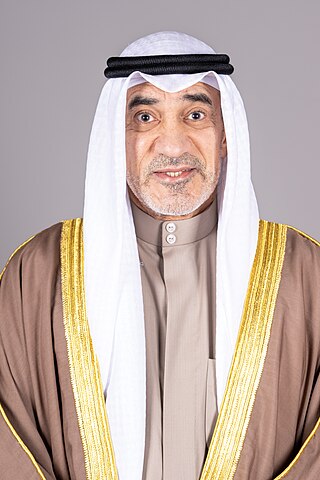Fahad Yusuf Al-Sabah
Kuwaiti Minister of Defense From Wikipedia, the free encyclopedia
Sheikh Fahad Yusuf Saud Al-Sabah (born 1959) is a former Kuwaiti military officer. He served as Deputy Prime Minister and Minister of Interior from January 17, 2024, and as Minister of Defense from January 17, 2024, until February 4, 2025.[1][2][3][4][5]
Fahad Yusuf Al-Sabah | |
|---|---|
فهد يوسف سعود الصباح | |
 Official portrait, 2024 | |
| Deputy Prime Minister and Minister of Interior | |
| Assumed office 17 January 2024 | |
| Monarch | Mishal Al-Ahmad Al-Sabah |
| Prime Minister | Mohammad Al-Sabah Ahmad Al-Abdullah Al-Sabah |
| Preceded by | Talal Al-Khaled |
| Minister of Defense | |
| In office 17 January 2024 – 4 February 2025 | |
| Preceded by | Ahmad Al-Fahad Al-Sabah |
| Succeeded by | Abdullah Ali Al-Abdullah Al-Salem Al-Sabah |
| Personal details | |
| Citizenship | Kuwaiti |
Biography
Sheikh Fahd Yousuf Saud Al-Mohammed Al-Sabah was born on May 1, 1959. He graduated from the Military College in Kuwait. After his graduation, he worked as an officer in the Kuwaiti Army's Amiri Guard and progressed in his career until he retired with the rank of Colonel. Notably, he was involved in the evacuation and protection of the then Amir of Kuwait, Sheikh Jaber Al-Ahmad Al-Sabah, and the Crown Prince, Sheikh Saad Al-Abdullah Al-Sabah, to Saudi Arabia in 1990 following the Iraqi invasion of Kuwait.[1]
On January 17, 2024, an Amiri decree was issued for the formation of the government, appointing him as the Deputy Prime Minister, the Minister of Defense, and the Minister of Interior.[1][6]
Controversy
Summarize
Perspective
Citizenship Revocation Campaign (2024–present)
In late 2024, Fahad Yusuf Al-Sabah initiated a sudden controversial policy to revoke the citizenship of approximately 42,000 Kuwaiti nationals, resulting in widespread statelessness within a six-month period. Al-Sabah publicly described the revocations as targeting fraudulent citizenship cases; however, critics highlighted that more than two-thirds of those affected were women who had legally acquired nationality under Article 8 of Kuwait’s nationality law, through marriage to Kuwaiti citizens. Many of these women had held citizenship for decades before abruptly losing their status without prior notice, causing significant public anxiety and social disruption.[7][8]
Kuwait faced extensive domestic and international criticism, with human rights advocates and opposition figures asserting that his actions were discriminatory and politically motivated. Following widespread backlash, Al-Sabah partially reversed some of the policy’s most severe effects, reinstating affected individuals’ access to banking services, pensions, and essential government services. Despite these measures, criticism persisted over the long-term implications for Kuwait’s democratic reputation and social cohesion.[7][9][8]
References
Wikiwand - on
Seamless Wikipedia browsing. On steroids.
